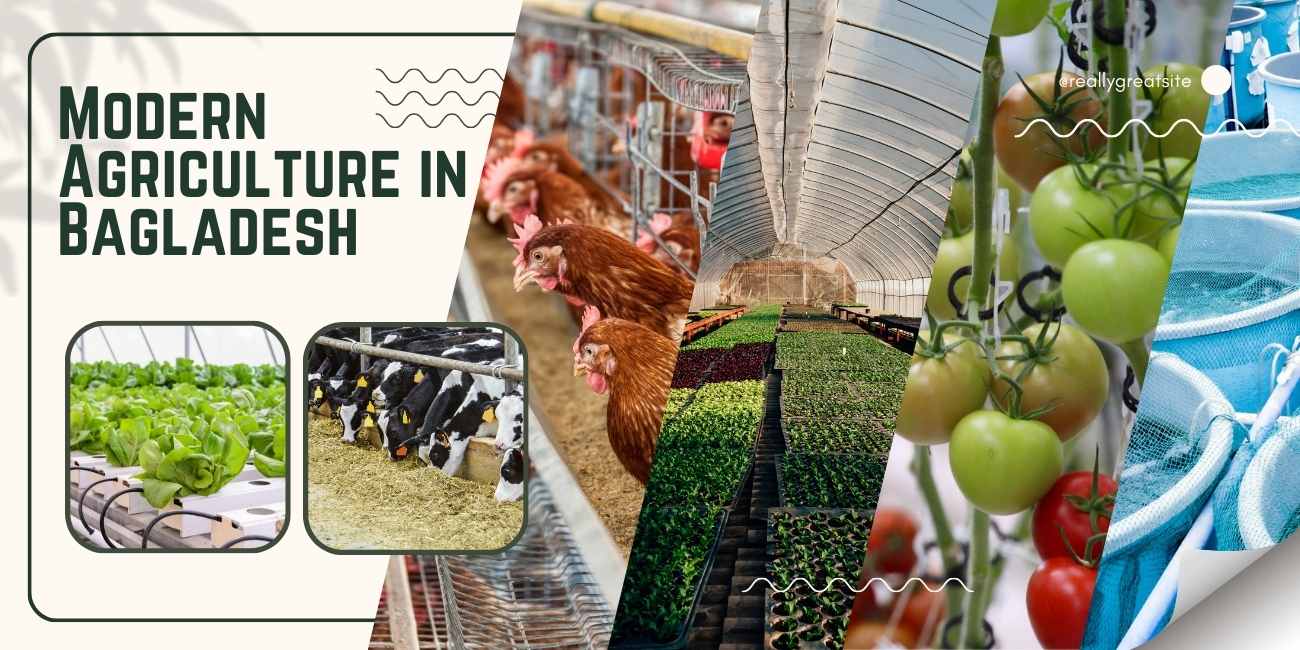
Modern Agriculture in Bagladesh
Revolutionizing Farming: The Modern Agricultural Boom in
Bangladesh
In recent years, Bangladesh has witnessed a remarkable
transformation in its agricultural sector. With advancements in technology,
sustainable practices, and government initiatives, the country has experienced
a modern agricultural boom that is revolutionizing farming practices. This
article explores the exciting changes taking place in the agricultural
landscape of Bangladesh and how they are shaping the future of farming in the
nation.
Table of Contents
- Introduction
- The
Green Revolution: A Historical Perspective
- Technological
Advancements in Agriculture 3.1. Leveraging Mobile Technology 3.2.
Precision Farming Techniques
- Sustainable
Farming Practices 4.1. Organic Farming 4.2. Crop Rotation and
Diversification
- Government
Initiatives 5.1. Subsidies and Support Programs 5.2. Infrastructure
Development
- Empowering
Small-Scale Farmers 6.1. Access to Credit and Finance 6.2. Training
and Education
- Enhancing
Crop Yields 7.1. Improved Seed Varieties 7.2. Irrigation Systems
- Challenges
and Solutions 8.1. Climate Change and Adaptation 8.2. Market Access
and Distribution
- The
Economic Impact
- The
Role of Women in Agriculture
- Future
Prospects and Sustainability
- Conclusion
- Frequently
Asked Questions (FAQs)
Introduction
Bangladesh, a densely populated South Asian country, has
long relied on agriculture as a cornerstone of its economy. In recent times,
this sector has undergone a remarkable transformation, ushering in a modern
agricultural boom that promises to improve the livelihoods of millions of
farmers and contribute to the nation's food security.
The Green Revolution: A Historical Perspective
The modern agricultural revolution in Bangladesh has its
roots in the Green Revolution of the 1960s and 1970s. During this period, the
introduction of high-yield crop varieties, improved irrigation, and the use of
fertilizers significantly increased crop production.
Technological Advancements in Agriculture
Leveraging Mobile Technology
One of the key drivers of the modern agricultural boom in
Bangladesh is the widespread use of mobile technology. Farmers now have access
to valuable information on weather forecasts, market prices, and best farming
practices through their smartphones.
Precision Farming Techniques
Precision farming has gained popularity in Bangladesh. This
approach involves using data and technology to optimize every aspect of
farming, from planting and fertilizing to harvesting. It maximizes efficiency
while minimizing resource use.
Sustainable Farming Practices
Organic Farming
Many farmers in Bangladesh have embraced organic farming
practices, reducing the use of chemical pesticides and promoting healthier,
more sustainable agriculture.
Crop Rotation and Diversification
Crop rotation and diversification help maintain soil
fertility and reduce the risk of pests and diseases. Farmers are increasingly
adopting these practices.
Government Initiatives
Subsidies and Support Programs
The government of Bangladesh has implemented various
subsidies and support programs to assist farmers in acquiring modern farming
equipment, seeds, and fertilizers at affordable prices.
Infrastructure Development
Investments in rural infrastructure, such as roads and
storage facilities, have improved the accessibility of markets, reducing
post-harvest losses.
Empowering Small-Scale Farmers
Access to Credit and Finance
Small-scale farmers now have better access to credit and
financial services, enabling them to invest in their farms and improve
productivity.
Training and Education
Government-sponsored training programs and workshops educate
farmers about modern farming techniques, ensuring they stay up-to-date with the
latest practices.
Enhancing Crop Yields
Improved Seed Varieties
The introduction of high-yield and disease-resistant seed
varieties has significantly increased crop yields, ensuring food security for
the nation.
Irrigation Systems
Investments in irrigation systems have reduced dependence on
rain-fed agriculture, allowing farmers to grow crops throughout the year.
Challenges and Solutions
Climate Change and Adaptation
Bangladesh is vulnerable to climate change impacts, such as
floods and cyclones. Farmers are adopting climate-resilient practices and crop
varieties to mitigate these risks.
Market Access and Distribution
Efficient market access and distribution networks are
crucial for farmers to sell their produce. Initiatives are underway to improve
these systems.
The Economic Impact
The modern agricultural boom has not only improved food
security but has also contributed significantly to the nation's economy,
creating jobs and boosting incomes.
The Role of Women in Agriculture
Women play a vital role in Bangladesh's agriculture. They
are actively involved in farming activities, contributing to the sector's
growth and sustainability.
Future Prospects and Sustainability
The future of farming in Bangladesh looks promising, with
continued government support, technological advancements, and sustainable
practices. The nation is well on its way to becoming a model for modern
agriculture in the region.
Conclusion
The modern agricultural boom in Bangladesh signifies a
remarkable transformation in the farming sector. With technology,
sustainability, and government initiatives at the forefront, Bangladesh's
agriculture is poised for a bright and prosperous future.
Frequently Asked Questions (FAQs)
- What
is the Green Revolution's role in Bangladesh's modern agricultural boom?
The Green Revolution laid the foundation for modern
agricultural practices in Bangladesh by introducing high-yield crop varieties
and improved farming techniques.
- How
is mobile technology contributing to agriculture in Bangladesh?
Mobile technology provides farmers with access to valuable
information on weather forecasts, market prices, and best farming practices,
improving decision-making.
- What
are some sustainable farming practices adopted by Bangladeshi farmers?
Sustainable practices include organic farming, crop
rotation, and diversification, reducing the reliance on chemical pesticides.
- How
has the government supported small-scale farmers in Bangladesh?
The government has provided subsidies, access to credit, and
training programs to empower small-scale farmers and enhance their
productivity.
- What
is the economic impact of the modern agricultural boom in Bangladesh?
The boom has not only improved food security but has also
created jobs and boosted incomes, contributing significantly to the nation's
economy.
Get Access Now: hydrobangla.com
In conclusion, the modern agricultural boom in Bangladesh is
a testament to the nation's commitment to sustainable farming practices,
technological advancements, and inclusive growth. It has the potential to
transform the lives of millions of farmers and secure food security for the
nation in the years to come.